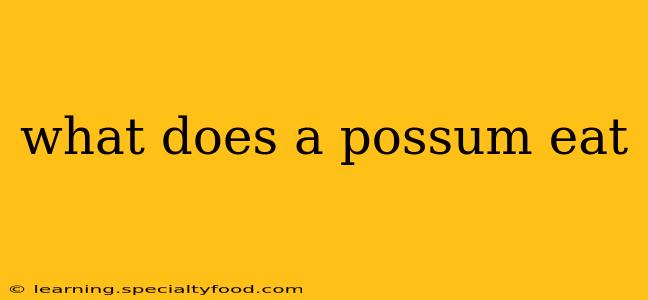Opossums, those often misunderstood nocturnal marsupials, play a vital role in their ecosystems. Understanding their diet is key to appreciating their ecological contribution and dispelling common misconceptions. This guide delves into what opossums eat, exploring their opportunistic feeding habits and addressing frequently asked questions.
What is the primary food source for opossums?
Opossums are omnivorous scavengers, meaning their diet is incredibly diverse and adaptable. Their primary food source isn't one specific item, but rather a combination of readily available options. They are opportunistic feeders, consuming whatever is easiest to find and access. This can include insects, fruits, and carrion (dead animals). In essence, their diet is highly influenced by their environment and the seasonal availability of food.
What kind of insects do opossums eat?
Opossums are particularly adept at consuming a wide range of insects. Their diet might include beetles, grasshoppers, crickets, caterpillars, and other invertebrates. They are efficient insect controllers, helping to regulate insect populations in their habitats. The specific insects consumed will vary based on geographic location and the time of year.
Do opossums eat plants?
Yes, opossums supplement their diet with plant material. They consume various fruits, berries, nuts, and seeds. This plant-based component provides essential vitamins and minerals, complementing their protein-rich insect and carrion intake. The type of plant matter consumed will depend on what's available in their environment.
What other foods do opossums eat?
Beyond insects and plants, opossums are known to consume a surprising variety of other foods. This can include:
- Carrion: Opossums are important scavengers, consuming dead animals. This helps clean up the environment and prevents the spread of disease.
- Eggs: They will readily consume bird eggs and the eggs of reptiles if they can find them.
- Small vertebrates: While less common, opossums may occasionally prey on small animals like rodents, snakes, frogs, or lizards, especially when other food sources are scarce.
- Garbage: Sadly, opossums are often attracted to human garbage, leading to conflicts with humans. This highlights the importance of proper waste disposal.
What do baby opossums eat?
Baby opossums, or joeys, initially rely entirely on their mother's milk. As they grow, they gradually start to sample the same foods their mother consumes, with the mother often regurgitating food for her young. This transition to solid food occurs over several weeks.
Are opossums harmful to pets?
While opossums generally aren't aggressive towards pets, they may occasionally act defensively if cornered or threatened. However, they rarely initiate attacks. The main concern is the potential transmission of diseases, although this risk is relatively low compared to other wild animals. Proper vaccination and responsible pet ownership are crucial.
Do opossums eat mice?
Although not a primary food source, opossums can and do occasionally eat mice. This usually occurs when other food is scarce or when a mouse is easily accessible. However, it's important to remember that they are opportunistic feeders and won't actively hunt mice in most situations.
What are the benefits of opossums in the ecosystem?
Opossums play several crucial roles in their ecosystems:
- Pest control: Their consumption of insects helps regulate insect populations.
- Scavenging: They remove carrion, preventing the spread of disease and maintaining environmental hygiene.
- Seed dispersal: Their consumption and dispersal of seeds contributes to plant reproduction and biodiversity.
Understanding the diet of the opossum provides crucial insight into its ecological importance. By dispelling myths and promoting accurate knowledge, we can better appreciate the role these fascinating creatures play in our environment.
